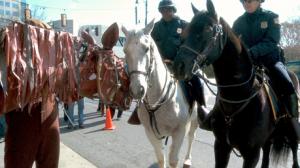By Nancy Brannon
A number of mid-south horse people attended the opening performance of “War Horse” at the historic Orpheum Theater in Memphis, TN on March 25. Earlier in the day, three equine members of the Memphis Police Department Mounted Patrol got to “meet” Joey outside the Orpheum Theater.*
Chatting with some during intermission, they were impressed with the excellent quality of the stage production and the accuracy of the “horse” movements of the larger than life-sized puppets, operated by three people. One horsewoman said she was brought to tears during the more poignant scenes of Albert with his beloved horse Joey. Another captured the main message of the show as he left the theater: “It makes you want to go home and hug your horse.”
Horse people know full well the strong bonds that can form between people and their horses, and they fully understand and identify with the bond between Albert and Joey. Even though Joey and the other horse Topthorn are puppets, it’s easy to suspend disbelief and identify with the horse’s perspective throughout the play. It’s the eye of the puppet on which we focus, and also the ears, ignoring the “men behind the scene” that are so obviously operating the puppet.
The setting is the Devonshire countryside in England in 1914. It starts when Albert’s dad wins the bidding war with his brother and buys Joey – with the mortgage money, much to the chagrin of his wife. Not long afterward, Albert faces his next challenge: he must teach Joey to plow in a week, or his dad loses yet another bet with his brother. The efforts are successful and only lend strength to the bond that now extends to Albert’s mom.
But as World War I starts, Albert’s dad finds an opportunity to sell Joey for 100 pounds (more than three times what he paid for Joey) as a cavalry officer’s horse. Albert is heartbroken about the sale of his horse, and it’s not long thereafter when Albert enlists in the army to go find his horse.
There are some humorous moments as Albert chats with a fellow infantryman, who shows Albert a photo of his sweetheart, while Albert has only a drawing of his beloved horse to share. Doesn’t everyone carry around a photo of their horse in their wallet or iPhone?
But the horrible reality of war keeps rearing its loud and ugly head. To the harsh German colonel, “Horses are beasts!” to be used for pulling heavy weaponry and whatever other tasks armies need. If they die in the process, they’re just another casualty of war and he has no qualms about shooting an exhausted horse. But his comrade, Captain Friedrich Muller, comes to realize the unnecessary carnage of war and has an opportunity to trade uniforms with a deceased Red Cross attendant allowing him, at least temporarily, to remove himself, and protect Joey and Topthorn, from the heat of battle.
A very poignant moment is when Joey, running madly trying to escape the war, gets tangled in barbed wire. As he stands there, unable to remove his injured leg from the wire, he is observed by both British and German troops. Both sides pity the poor creature and, as white flags are waved, a soldier from each side comes to rescue Joey. Humor ensues as one tries to communicate with the other, only to the response “I don’t speak English.” But the German soldier shows his wire clippers, and together they untangle Joey and free him from the wire. “He’s lost a lot of blood, one says as they try to bandage his leg. He is soon removed to the Red Cross tent where the veterinary officer treats Joey. At the same facility is a blindfolded Albert, recovering from his encounter with poison gas.
The stage production was excellent! On a tattered white screen above the stage images are projected to set the scene. The puppeteers from the Handspring Puppet Company skillfully manipulate the puppets to imitate realistic horse movements in Joey and Topthorn. The goose puppet provided much needed comic relief in several scenes. And the sounds and sights of war – machine gun fire and explosions – give the audience a sense of being in the midst of war. The tank puppet is especially ominous!
The stage production leaves the audience with a heightened sensitivity of the insanity, destruction, and uselessness of war, removing all the glorification with which war is generally presented. It evokes the caring emotions of kindness toward animals, especially horses, as well as shows the commonality of humans, even though they may be “enemies.”
If you missed it in Memphis, War Horse shows in Nashville at the Tennessee Performing Arts Center June 3-8. For more information, visit: https://patron.tpac.org/events/detail/war-horse-tpac
*Read the WMC-TV report at: www.wmctv.com/story/25068498/war-horse-meets-mpd-mounted-patrol-officers
A number of mid-south horse people attended the opening performance of “War Horse” at the historic Orpheum Theater in Memphis, TN on March 25. Earlier in the day, three equine members of the Memphis Police Department Mounted Patrol got to “meet” Joey outside the Orpheum Theater.*
Chatting with some during intermission, they were impressed with the excellent quality of the stage production and the accuracy of the “horse” movements of the larger than life-sized puppets, operated by three people. One horsewoman said she was brought to tears during the more poignant scenes of Albert with his beloved horse Joey. Another captured the main message of the show as he left the theater: “It makes you want to go home and hug your horse.”
Horse people know full well the strong bonds that can form between people and their horses, and they fully understand and identify with the bond between Albert and Joey. Even though Joey and the other horse Topthorn are puppets, it’s easy to suspend disbelief and identify with the horse’s perspective throughout the play. It’s the eye of the puppet on which we focus, and also the ears, ignoring the “men behind the scene” that are so obviously operating the puppet.
The setting is the Devonshire countryside in England in 1914. It starts when Albert’s dad wins the bidding war with his brother and buys Joey – with the mortgage money, much to the chagrin of his wife. Not long afterward, Albert faces his next challenge: he must teach Joey to plow in a week, or his dad loses yet another bet with his brother. The efforts are successful and only lend strength to the bond that now extends to Albert’s mom.
But as World War I starts, Albert’s dad finds an opportunity to sell Joey for 100 pounds (more than three times what he paid for Joey) as a cavalry officer’s horse. Albert is heartbroken about the sale of his horse, and it’s not long thereafter when Albert enlists in the army to go find his horse.
There are some humorous moments as Albert chats with a fellow infantryman, who shows Albert a photo of his sweetheart, while Albert has only a drawing of his beloved horse to share. Doesn’t everyone carry around a photo of their horse in their wallet or iPhone?
But the horrible reality of war keeps rearing its loud and ugly head. To the harsh German colonel, “Horses are beasts!” to be used for pulling heavy weaponry and whatever other tasks armies need. If they die in the process, they’re just another casualty of war and he has no qualms about shooting an exhausted horse. But his comrade, Captain Friedrich Muller, comes to realize the unnecessary carnage of war and has an opportunity to trade uniforms with a deceased Red Cross attendant allowing him, at least temporarily, to remove himself, and protect Joey and Topthorn, from the heat of battle.
A very poignant moment is when Joey, running madly trying to escape the war, gets tangled in barbed wire. As he stands there, unable to remove his injured leg from the wire, he is observed by both British and German troops. Both sides pity the poor creature and, as white flags are waved, a soldier from each side comes to rescue Joey. Humor ensues as one tries to communicate with the other, only to the response “I don’t speak English.” But the German soldier shows his wire clippers, and together they untangle Joey and free him from the wire. “He’s lost a lot of blood, one says as they try to bandage his leg. He is soon removed to the Red Cross tent where the veterinary officer treats Joey. At the same facility is a blindfolded Albert, recovering from his encounter with poison gas.
The stage production was excellent! On a tattered white screen above the stage images are projected to set the scene. The puppeteers from the Handspring Puppet Company skillfully manipulate the puppets to imitate realistic horse movements in Joey and Topthorn. The goose puppet provided much needed comic relief in several scenes. And the sounds and sights of war – machine gun fire and explosions – give the audience a sense of being in the midst of war. The tank puppet is especially ominous!
The stage production leaves the audience with a heightened sensitivity of the insanity, destruction, and uselessness of war, removing all the glorification with which war is generally presented. It evokes the caring emotions of kindness toward animals, especially horses, as well as shows the commonality of humans, even though they may be “enemies.”
If you missed it in Memphis, War Horse shows in Nashville at the Tennessee Performing Arts Center June 3-8. For more information, visit: https://patron.tpac.org/events/detail/war-horse-tpac
*Read the WMC-TV report at: www.wmctv.com/story/25068498/war-horse-meets-mpd-mounted-patrol-officers












